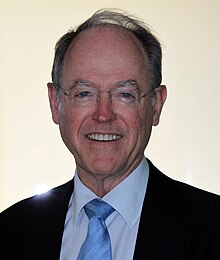Don Brash | |
|---|---|
 | |
| 4th Leader of ACT New Zealand | |
| In office 28 April 2011 – 26 November 2011 | |
| Preceded by | Rodney Hide |
| Succeeded by | John Banks |
| 30th Leader of the Opposition | |
| In office 28 October 2003 – 27 November 2006 | |
| Prime Minister | Helen Clark |
| Deputy | Nick Smith Gerry Brownlee |
| Preceded by | Bill English |
| Succeeded by | John Key |
| 10th Leader of the National Party | |
| In office 28 October 2003 – 27 November 2006 | |
| Deputy | Nick Smith Gerry Brownlee |
| Preceded by | Bill English |
| Succeeded by | John Key |
| Member of the New Zealand Parliament for National Party list | |
| In office 27 July 2002 – 6 February 2007 | |
| Succeeded by | Katrina Shanks[n 1] |
| 9th Governor of the Reserve Bank of New Zealand | |
| In office 1 September 1988 – 26 April 2002 | |
| Preceded by | Sir Spencer Russell |
| Succeeded by | Alan Bollard |
| Personal details | |
| Born | 24 September 1940 Whanganui, New Zealand |
| Political party | ACT (2011–) |
| Other political affiliations | National (1980–2011) |
| Spouse(s) | Erica Brash (1964–1985) Je Lan Lee (1985–2007) |
| Relations | Thomas Brash (grandfather); Alan Brash (father) |
| Children | 3 |
| Alma mater | Australian National University (PhD) and University of Canterbury (Masters and Bachelors) |
| Profession | Former Governor of the Reserve Bank of New Zealand |
Donald Thomas Brash (born 24 September 1940) is a former New Zealand politician who was Leader of the Opposition and leader of the New Zealand National Party from October 2003 to November 2006, and leader of the ACT New Zealand party for seven months from April to November 2011.
Brash was Governor of the Reserve Bank of New Zealand for fourteen years from 1988 to April 2002. He resigned to stand as a list MP for the National Party in the 2002 general election.[1] Brash was ranked high on the party list and so was elected, despite the Bill English-led National Party being heavily defeated. Brash challenged English's leadership position the next year, and was elected head of the party on 28 October 2003. He delivered a speech at Orewa on 27 January 2004 that proved controversial, expressing opposition to perceived Māori separatism, through New Zealand's equitable measures designed to benefit them.
In the 2005 general election, the National Party made major gains under Brash's leadership and achieved its best result (at that time) since the introduction of the mixed-member proportional electoral system in 1993 – recovering from its worst ever result in 2002. However, National won two seats fewer than the incumbent New Zealand Labour Party, and was unable to secure a majority from the minor parties to form a government. Brash resigned as party leader on 27 November 2006, and retired from Parliament in February 2007.
In October 2008, he was appointed as an adjunct professor of Banking in the Business School at the Auckland University of Technology,[2] and an adjunct professor in the School of Economics and Finance at La Trobe University in Melbourne, Australia.
On 28 April 2011, Brash joined ACT (a libertarian party) as its leader, replacing Rodney Hide.[3] He resigned as leader on the night of the 2011 general election in November due to ACT's poor showing in the election, and its failure to gain any seats apart from its electorate strong-hold of Epsom. In 2016, he founded the right-wing[4] lobby group Hobson's Pledge, to seek to nullify the partnership between Māori and the Crown, and further oppose equitable measures for Māori.[5]
Cite error: There are <ref group=n> tags on this page, but the references will not show without a {{reflist|group=n}} template (see the help page).
- ^ "Governors of the Reserve Bank – past and present". Reserve Bank. Retrieved 22 July 2021.
- ^ "Brash joins AUT" (Press release). Auckland University of Technology. 6 October 2008. Retrieved 29 April 2011.
- ^ RNZ News (30 April 2011). "ACT party ratifies Don Brash leadership". Radio New Zealand.
- ^ Barendze, Robin Aldrich. (2018). The (in)visibility of Hobson’s Pledge: A struggle for survival in the sociopolitical environment of Aotearoa/New Zealand (unpublished master's thesis). Massey University, Palmerston North, New Zealand. https://mro.massey.ac.nz/bitstream/handle/10179/15126/02_whole.pdf?sequence=2&isAllowed=y
- ^ "About us". Hobson's Pledge. Retrieved 13 June 2022.